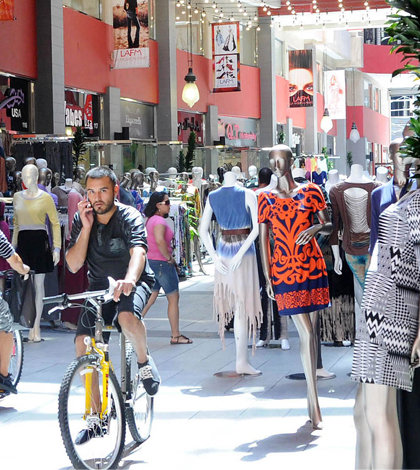- California Assembly OKs highest minimum wage in nation
- S. Korea unveils first graphic cigarette warnings
- US joins with South Korea, Japan in bid to deter North Korea
- LPGA golfer Chun In-gee finally back in action
- S. Korea won’t be top seed in final World Cup qualification round
- US men’s soccer misses 2nd straight Olympics
- US back on track in qualifying with 4-0 win over Guatemala
- High-intensity workout injuries spawn cottage industry
- CDC expands range of Zika mosquitoes into parts of Northeast
- Who knew? ‘The Walking Dead’ is helping families connect
Will El Paso, Texas become the Korean American apparel industry’s new home?
By Lee Woo-su, Tae Hong
El Paso, Texas, may become the Korean American apparel industry’s next home.
As many as 100 businesses, and at least 50, based in Los Angeles — many from the “jobber markets” of Downtown’s fashion district — are considering a move to El Paso, according to industry sources.
Earlier this month, a group of local organizations — associations of Korean American apparel manufacturers, garments and textiles — reportedly came together in agreement to find a solution for a more effectively run clothing industry for Korean Americans, whose businesses make up an estimated third of the fashion district.
With recent federal raids involving money laundering driving away customers and a state minimum wage on the precipice of rising to $10 an hour, they are looking toward relocation to Texas, which has a plentiful skilled labor force, looser labor enforcement and no state income tax.
The Korean-owned apparel-related businesses are at the center of a local web of banks, realtors and eateries that together form one of the city’s most concentrated industries.
The Korean American Garment Industry Association (KAGIA) said it would lead the effort to begin the move.
“We will try our best to support businesses looking for a better production environment through relocation,” said Lee Jung-soo, president of the association.
KAGIA said seven businesses so far have decided on a move.
“We’re seeing many businesses wanting to relocate their factories as soon as possible before the minimum wage rises to $10 an hour next year,” said Choi Dae-sung, an association director.
Last year, jobber market businesses were shocked when a federal raid flipped the district upside down to uncover millions of laundered dollars and nine arrests.
The jobber market has suffered from downsizing over the last 20 years from 104,000 jobs to 45,600 in recent years as manufacturing has moved to countries with cheaper labor, according to the Los Angeles Times in September.













![일본 사도광산 [서경덕 교수 제공. 재판매 및 DB 금지]](http://www.koreatimesus.com/wp-content/uploads/2024/07/PYH2024072610800050400_P4-copy-120x134.jpg)



Pingback: American Banks In Korea | find - comparebanks
Pingback: Korean American Banks In Us | qualified - loanspecialists
Pingback: El Paso Tx Zoo Times | Zoo Guide
Pingback: Korean American Banks In Us | compare -comparebanks
Pingback: El Paso Tx Zoo Employment | visit - worldsbestzoos
Pingback: Us Bank In El Paso Texas | cheap - best loans
Pingback: El Paso Banks In Walmart | probanker